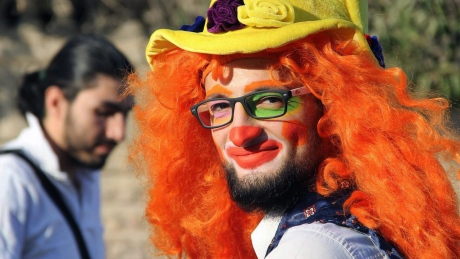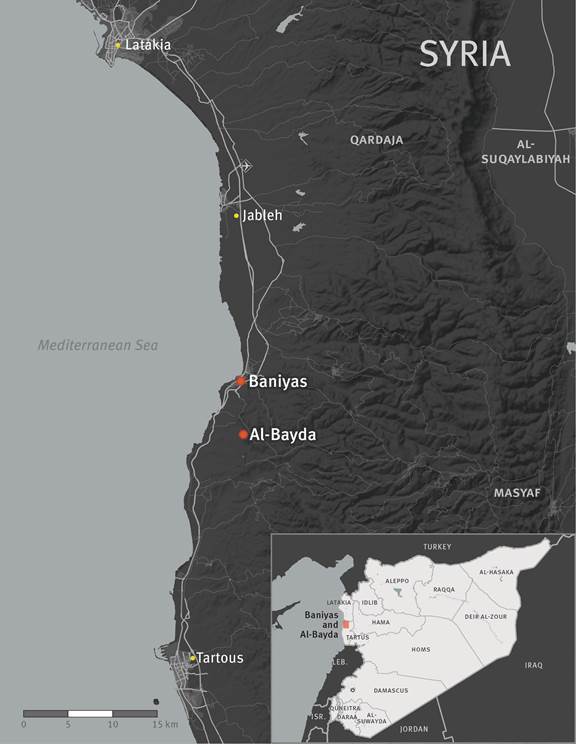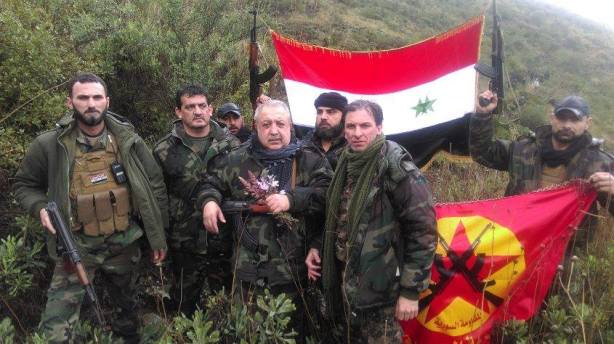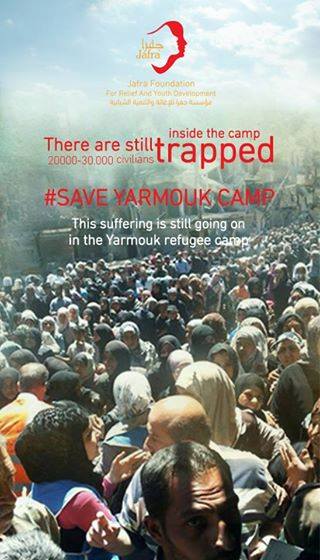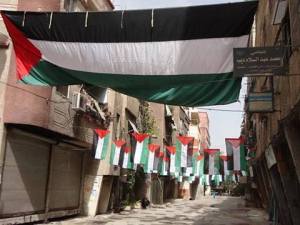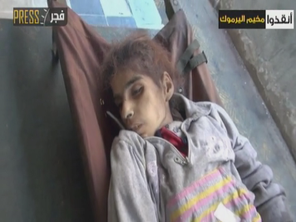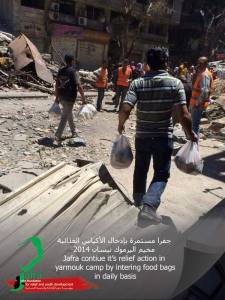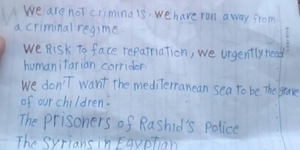
Affiches géantes, pour rappeler au peuple qui commande.
Ruth Riegler a interrogé un activiste syrien afin de mieux comprendre sa vie dans la Syrie révolutionnaire. Il apparaît sous un pseudonyme. Traduit par Eric Lamy.
R. R. : Comment décririez-vous la vie en Syrie avant la révolution, et comment définiriez-vous les causes premières de celle-ci ?
S. L. : Mon nom est Syrien Libre. Je veux que le monde sache pourquoi nous faisons la révolution contre Bashar Al Assad et son régime. Chacun sait aujourd’hui que c’est une révolution majeure, mais personne ne sait, en fait, quelles en sont les raisons profondes. Je vais vous le dire. Je veux que le monde sache comment nous vivions avant la révolution, qu’il en sache les vraies raisons. Nous vivions dans un monde où nous n’avions qu’à obéir comme des esclaves, quelque soit l’ordre du maître. Nous n’avions qu’à obéir et nous exécuter. En cas de désobéissance, nous étions punis ou exécutés.
Nous vivions dans un état de haute sécurité, ce qui signifie que nous étions gouvernés par un président unique avec ses militaires, ses services secrets, ses officiers, sa police militaire, sa police, ses indicateurs et ses shabihas [gangs armés]. Pour faire quoique ce soit, il vous fallait d’abord obtenir une autorisation et vérifier que la loi vous permettait d’agir ou non ; ce qui signifie que vous n’aviez aucun droit d’agir de vous-même et que vous auriez à affronter des obstacles si vous persistiez. Seuls les tenants du pouvoir pouvaient vivre librement et en dehors des lois. Ils pouvaient agir en toute liberté sans rien demander à personne, tout en contrôlant chaque quartier, y compris le système politique, le secteur industriel du pétrole et du gaz, l’économie du pays, les banques, le commerce, l’armée, l’agriculture et l ‘éducation. Dans les faits, ils se considéraient comme des dieux.

C’est Hafez (et ensuite Bashar) qui ont permis à Israël d’occuper militairement les Hauteurs du Golan.
Nous avons vécu sous ce régime qui prétend être anti-sioniste, mais c’est, en fait, un autre mensonge : il n’a jamais tiré un coup de feu contre Israël et il a maintenu la paix dans les Hauteurs du Golan, interdisant à tout syrien d’attaquer l’État Juif ou de réclamer ce territoire annexé. Tout homme qui l’aurait osé eût été jeté en prison, puni et probablement exécuté. Nous vivions comme des esclaves, sans aucun droit. Nous n’avions pas celui de choisir un candidat au poste de président ou d’organiser des élections libres, de créer des partis politiques ou de choisir des députés, d’élire un parlement. Seuls Assad et ses services secrets pouvaient choisir des députés, et leurs choix allaient invariablement vers les plus corrompus, les plus dénués de moralité ou de conscience. Si vous vous opposiez à la moindre de leurs actions, vous étiez jetés en prison. Ils faisaient de vous ce qu’ils voulaient parce que vous n’étiez rien. Les gens avaient peur de s’opposer, d’être en désaccord avec le régime ou avec quelqu’un qui fût proche des services secrets : les Syriens ont appris à courber l’échine et à se taire. Si vous osiez maudire Bashar, les hommes du régime venaient vous saisir où que vous soyiez pour vous embarquer à l’antenne locale des services secrets. Personne ne savait où vous étiez passé, personne n’osait s’en informer ou même prononcer votre nom. Si jamais vous vouliez créer un mouvement politique, ils agissaient de même : en Syrie, il n’y avait qu’un seul parti, et tous les syriens étaient obligés d’y adhérer. Au cas où vous aviez l’intention d’échapper au service militaire obligatoire, vous étiez jeté en prison pour au moins trois mois, puis forcé de servir quand même.. S’il vous arrivait de mourir pendant votre incarcération dans les geôles des services secrets, personne n’aurait cherché à savoir comment et pourquoi. Personne, évidemment, n’aurait pu être tenu responsable de votre mort car la constitution syrienne garantit au président, à ses services secrets, ses militaires et ses collaborateurs une immunité totale. Les syriens étaient traités comme des insectes qu’on écrase sous une botte. Leur vie importait peu.

On ne peut représenter l’oppression, mais on peut la ressentir.
Le système permettait au président, son armée et ses services secrets d’arrêter, de torturer et de tuer n’importe qui, de disposer de nous et personne, en dehors du pays, ne savait ce qui s’y passait. La corruption, le népotisme et les faveurs étaient la règle à tous les niveaux de l’état, et les gens ont appris à survivre et à ne s’occuper que de soi, sans poser de question, sans s’occuper des autres. Seuls Assad et les proches du régime pouvaient agir à leur guise. La Syrie était une grande ferme et les syriens en étaient le bétail.
Il faut que je vous parle de l’économie du pays. En dépit de la découverte de réserves de pétrole et de gaz dans le Nord-Est de la Syrie ainsi que d’énormes gisements en Mer Méditerranée, nous nous sommes toujours étonnés de ce que ces matières premières étaient si chères pour nous, et pourquoi devions-nous les importer d’Iran, d’Iraq et d’Égypte. Nous avons découvert que c’est parce que Bashar et sa famille volaient le gaz et le pétrole syriens pour le vendre au rabais à la Russie et à l’Europe. Ils se mettaient l’argent dans la poche, pendant que les Syriens n’ont d’autre choix que d’acheter leur carburant et leur gaz à un prix élevé dans les centres de distribution de l’état, quand on avait la chance d’en trouver un. Le gouvernement a constamment gonflé le prix du pétrole et du gaz. Conséquemment, les prix des autres denrées, pain, riz, sucre, habillement, appareils électroniques, maisons, tout, enfin, à augmenté et continué d’augmenter sans jamais diminuer. Quand on pense aux réserves de notre pays en énergies fossiles, cette situation est tout à fait grotesque.
L’économie syrienne toute entière est une farce : lorsque le gouvernement recevait une aide d’autres pays, toute question de notre part relative à la destination de ces fonds restait sans réponse. Quand nous voulûmes nous pencher sur le développement du système éducatif de notre pays, de la santé, de l’agriculture, du secteur industriel ou du réseau électrique national, le gouvernement nous répondit que cette idée entraînerait une hausse des impôts ainsi qu’un surcroît de l’aide internationale parce que la Syrie n’avait pas les moyens de telles réformes.

Les agences de services secrets et les espions : le contrôle de la vie du peuple est total. Telle est l’existence sous le règne d’Assad.
Si un Syrien, désireux de vivre dignement voulait créer une entreprise, manufacture ou import de produits finis telles des voitures, de l’habillement ou de l’équipement électrique, le régime ne l’autorisait qu’à la condition qu’il obtienne une part des bénéfices, un pot-de-vin régulier, en plus des taxes habituelles. Si vous acceptiez cela, on vous accordait votre licence. Si vous refusiez, votre demande était rejetée, et les obstacles à votre projet commençaient à se dresser devant lui. Toute personne désirant ouvrir un commerce de quelque nature que ce soit (échoppe de rue vendant de l’épicerie, stand de bouquiniste, supérette ou cybercafé) devait en premier lieu obtenir l’aval des services secrets avant de faire sa demande auprès des services d’état concernés, à qui il devait verser un pot-de-vin. Si, par exemple, vous vouliez ouvrir un cybercafé, il vous fallait obtenir l’aval des services secrets. Ensuite, après vous être rendu au siège du ministère de la communication (et acquitté un backchich pour les fonctionnaires afin que votre demande soit prise en compte) il vous fallait vous rendre au bureau du gouvernement local puis à l’organisme financier d’état et naviguer au sein de cet écheveau bureaucratique pendant des mois avant d’arriver à un résultat. Même si vous vouliez vous marier et organiser la fête de la noce, vous deviez d’abord en obtenir la permission de l’état. Pardonnez-moi d’être un peu cru, mais c’est une boutade syrienne que de dire que “si tu veux coucher avec ta femme, il te faut l’autorisation écrite du gouvernement”.
En Syrie, tout homme d’un âge donné doit se soumettre à la conscription obligatoire. Beaucoup de mes compatriotes, dès qu’ils ont 18 ans, s’envolent pour l’étranger afin d’y travailler ou faire des études. Grâce au pot-de-vin, on peut échapper à la conscription. Mais si vous n’aviez pas les moyens de prendre l’avion, de travailler ou de suivre des études à l’étranger (et pas de moyen d’échapper à la conscription), il vous restait la possibilité d’être le domestique d’un officier, ou bien chauffeur, ou garde. Si vous pouviez verser un tant par semaine à un gradé, vous pouviez être dispensé de servir et être autorisé à trouver un travail au lieu de rester au chômage. Si vous aviez les moyens d’un gros backchich (un poste TV à un gradé, le paiement de ses factures de téléphone, l’entretien de sa voiture ou tout autre service) vous pouviez éviter le service militaire pendant deux ans. Après ce délai, il vous fallait recommencer votre vie à zéro.

Les syriens veulent la liberté !
Voilà le genre de choses qui nous ont conduit à nous dresser contre le régime d’Assad. Nous voulons la liberté. Nous voulons décider de nos vies. Nous voulons organiser et affermir notre pays de nos mains. Nous voulons construire, produire nos biens de consommation nous-mêmes. Nous voulons produire de nos propres mains. Nous voulons améliorer le système éducatif, le système de santé, l’agriculture et tous les autres secteurs d’activités qu’Assad à laissé en friche. Nous voulons innover. Nous voulons être les premiers Arabes à produire des voitures, des trains. Oui, comme tous les autres peuples du monde, nous réclamons la dignité. Pour toutes ces raisons, nous continuerons de nous battre et nous ne reculerons pas. Nous vivrons dans la dignité, ou bien nous mourrons en martyr. Nous réclamons la liberté.
R. R. : Pour donner au lecteur une idée de ce que vous et vos compatriotes vivez
aujourd’hui, pouvez-vous décrire une journée habituelle en Syrie ?
S. L. : Imaginez-vous un beau matin ensoleillé… Vous vous levez, faites votre toilette, prenez votre café, en souriant à l’idée de tout ce que vous allez faire aujourd’hui, en dépit des obstacles que le gouvernement met en travers de votre chemin. Ça, c’était avant la révolution. À présent, dormir la nuit, se lever tôt le matin, c’est terminé. Tout à changé depuis le début de notre chère révolution, le 15 mai 2011 à Deraa. Bien… Voilà ce qui a changé dans mon programme et dans ma vie en général. D’abord, je ne dors plus que très tard ou très peu, sans cesse réveillé par les bombardements, les obus, les coups de feu et les manifestations, matin ou soir. Mes habitudes ont changé également.
J’avais l’habitude de fréquenter une école de langues près de chez moi pour étudier l’anglais afin d’être traducteur. Cela me permettait, en outre, de rencontrer un ami et de dénicher une meilleure place pour obtenir une maîtrise de traducteur. J’avais trouvé une place à Preston (GB), mais je n’ai pu malheureusement répondre à cette offre d’emploi car je n’ai pas de passeport, et les cours au centre linguistique américain (cycle TOEFL) ont été suspendus. Bien que j’aie contacté le Conseil Britannique pour tenter de les persuader de dispenser un cours (cycles TOEFL ou ILTES) au Royaume-Uni, je ne pense pas pouvoir commencer ma maîtrise cette année. Je pense que l’occasion en est perdue. Mais ce n’est pas le seul problème que j’ai rencontré : après avoir cherché du travail quelques temps, j’en avais trouvé, l’an dernier, dans une société privée de communications. C’est tombé à l’eau, également, depuis que la situation, ici, n’a cessé d’empirer.
En plus, le fait de ne pas avoir fait mon service militaire signifie que je ne peux ni travailler, ni voyager pour passer ma maîtrise. Cela m’a vraiment déprimé : pas de travail, plus d’espoir de maîtrise, je perdais l’envie de vivre. Puis le régime s’est mis à tuer notre peuple. D’abord à Deraa, où les troupes d’Assad utilisèrent des balles réelles contre des manifestants désarmés, puis vinrent les chars à l’intérieur des villes. Nous autres, jeunes de Syrie, nous n’avons pas du tout aimé cela et nous avons commencé à manifester. Alors le régime à commencé à utiliser des nervis en civil et des casseurs, des brutes comme les shabihas pour nous terroriser.
 Depuis lors, le régime d’Assad n’a rien épargné contre nous. Avant la révolution, je faisais trois repas par jour. Aujourd’hui, un seul. Avant la révolution, je dormais huit heures par nuit. Aujourd’hui, je me contente de cinq heures de sommeil, mais je veille bien souvent jusqu’à l’aube. Je me suis débrouillé pour aider au mieux les compatriotes qui en avaient le plus besoin, en les cachant ou en aidant quiconque avait besoin de traduire des infos ou des vidéos envoyées par d’autres activistes. Je reçois des tas d’infos : je les traduis, je les partage au mieux, je discute avec mes amis et nous échangeons nos points de vue sur ce qu’il convient de faire. Notre principal sujet de conversation tourne autour de l’idée que chaque nation au sein de la Communauté Internationale soutient le régime de Bashar parce qu’elle ne veut pas perdre le toutou docile qui protège Israël et maintient la sécurité dans la région.
Depuis lors, le régime d’Assad n’a rien épargné contre nous. Avant la révolution, je faisais trois repas par jour. Aujourd’hui, un seul. Avant la révolution, je dormais huit heures par nuit. Aujourd’hui, je me contente de cinq heures de sommeil, mais je veille bien souvent jusqu’à l’aube. Je me suis débrouillé pour aider au mieux les compatriotes qui en avaient le plus besoin, en les cachant ou en aidant quiconque avait besoin de traduire des infos ou des vidéos envoyées par d’autres activistes. Je reçois des tas d’infos : je les traduis, je les partage au mieux, je discute avec mes amis et nous échangeons nos points de vue sur ce qu’il convient de faire. Notre principal sujet de conversation tourne autour de l’idée que chaque nation au sein de la Communauté Internationale soutient le régime de Bashar parce qu’elle ne veut pas perdre le toutou docile qui protège Israël et maintient la sécurité dans la région.
À présent, le régime à dressé des checkpoints dans toutes les villes et villages, sur tous les axes principaux, et il a fermé toutes les rues qui conduisent au palais présidentiel, à Damas. Il a placé également des snipers un peu partout, surtout dans les zones contrôlées par les rebelles. Si vous voulez faire des courses ou bien vous rendre à la salle de gym, voir des amis ou aller n’importe où, les troupes du régime vous arrêteront aux checkpoints et vérifieront votre identité sur une longue liste de noms : si vous êtes recherché, convaincu d’être un activiste ou que vous n’ayez pas fait votre service militaire, ils vous arrêtent ou bien vous tuent sur place. Il nous faut passer ces checkpoints tous les jours. Récemment, je me rendais chez des amis pour travailler à notre cause. J’ai été arrêté pendant une demi-heure. Je commençais à me faire du soucis. Un soldat m’a appelé. Je me suis approché pour demander ce qui n’allait pas. Il m’a regardé puis a dit : “Voilà tes papiers. Tu nous fais perdre notre temps avec des recherches inutiles. File.” Après cette aventure, j’ai décidé qu’à chaque fois que je sortirais, j’emprunterais des chemins de traverse pour éviter les checkpoints. Une autre fois, récemment, je me suis rendu à Barzeh pour voir les parents de Salim, un ami abattu par un sniper. Je voulais leur présenter mes condoléances. Au même moment, de violents affrontements avaient lieu dans le secteur, entre des troupes loyalistes et l’Armée Syrienne de Libération. Comme je me rendais à l’appartement des parents de Salim, un sniper à tiré et m’a manqué de peu. J’ai seulement réalisé ce qui arrivait quand un inconnu m’a tiré dans l’entrée de l’immeuble en disant : “Tu es cinglé ? Tu as donc envié de mourir ?”
 Ce porc de Bashar à donné ordre aux snipers de se positionner un peu partout et de descendre qui ils veulent. J’ai beaucoup d’amis qui ont été tués par des snipers. D’autres ont survécu à leurs tirs. Anwar, un ami qui n’avait peur de rien et qui était de toutes les manifs, à pris une balle dans la tête. Après un séjour de six mois en soins intensifs et une balle qui lui a traversé le crâne, Allah n’a pas voulu qu’il meure. Certes, il a survécu, mais il est a demi-paralysé et il peut à peine se servir de sa jambe et son bras droits. J’ai d’autres amis qui ont purement et simplement disparu depuis leur arrestation par les forces du régime. Personne ne sait où ils sont et s’ils sont en vie. L’un d’entre eux, Bilal, un ami proche, avait l’habitude de ne pas manquer une seule manif pour encourager la chute du régime… Tous les jours, j’entends parler d’amis kidnappés contre rançon, d’autres sont enlevés dans la rue ou à un checkpoint. Certains d’entre eux peuvent appeler leurs parents pour demander de l’argent. Tant que la rançon n’est pas versée, les ravisseurs ne donnent aucune nouvelle aux parents.
Ce porc de Bashar à donné ordre aux snipers de se positionner un peu partout et de descendre qui ils veulent. J’ai beaucoup d’amis qui ont été tués par des snipers. D’autres ont survécu à leurs tirs. Anwar, un ami qui n’avait peur de rien et qui était de toutes les manifs, à pris une balle dans la tête. Après un séjour de six mois en soins intensifs et une balle qui lui a traversé le crâne, Allah n’a pas voulu qu’il meure. Certes, il a survécu, mais il est a demi-paralysé et il peut à peine se servir de sa jambe et son bras droits. J’ai d’autres amis qui ont purement et simplement disparu depuis leur arrestation par les forces du régime. Personne ne sait où ils sont et s’ils sont en vie. L’un d’entre eux, Bilal, un ami proche, avait l’habitude de ne pas manquer une seule manif pour encourager la chute du régime… Tous les jours, j’entends parler d’amis kidnappés contre rançon, d’autres sont enlevés dans la rue ou à un checkpoint. Certains d’entre eux peuvent appeler leurs parents pour demander de l’argent. Tant que la rançon n’est pas versée, les ravisseurs ne donnent aucune nouvelle aux parents.
Il est impossible de décrire notre enfer. Plus d’ordre, plus aucune stabilité, et la Communauté Internationale qui regarde faire et se tait. Des tas de jeunes gens s’envolent à l’étranger pour survivre. Les autres rejoignent les rangs de l’ASL dans laquelle on retrouve de nombreux éléments qui ont déserté l’armée régulière où ils étaient obligés de servir. Voila ma vie en Syrie aujourd’hui. J’ai décidé de rallier l’ASL. Honnêtement, j’ai souvent envié de fuir le plus vite possible. J’ai songé à m’enfuir à l’étranger mais, comme je vous l’ai dit, je n’ai pas de passeport. Bien que j’aie demandé de l’aide à des tas d’amis et de connaissances, il est quasi impossible de sortir de Syrie sans passeport.

Conséquences du passage des tanks qui ont pénétré dans le camp palestinien de Yarmouk, près de Damas.
R. R. : Que répondez-vous à ceux qui continuent à prétendre qu’Assad est une figure emblématique de l’anti-sionisme ?
S. L. : Tout le monde sait que Hafez Al Assad (que Dieu le maudisse, lui et son fils !) a vendu les Hauteurs du Golan à Israël et qu’il est responsable de la mort de nombreux Palestiniens au Liban et en Syrie, et ce pour garantir la sécurité d’Israël au Liban. À présent, son fils Bashar fait la même chose mais d’une manière différente. Il a attaqué de nombreuses zones où vivent les Palestiniens établis en Syrie, surtout au camp de Yarmouk, près de Damas, et je l’ai vu de mes propres yeux. De même, il est tout à fait faux de croire que Bashar soutient le Hezbollah libanais dans sa lutte contre Israël. C’est pur mensonge. Chacun sait qu’Assad à donné le feu vert au Hezbollah pour assassiner le leader sunnite Rafiq Al Hariri au Liban. De même, le soutien syrien pour redorer le blason de Nasrallah [chef du Hezbollah libanais] afin qu’il puisse se poser en héros de guerre ; la guerre de 2007 contre Israël était pourtant un autre mensonge, un stratagème pour permettre l’expansion du Hezbollah au Liban, et donner aux chiites l’occasion d’accroître leur mainmise sur ce pays, en permettant à l’Iran de renforcer son contrôle sur la région. C’est le projet de Téhéran au Moyen-Orient : constituer un croissant chiite qui s’étendrait de l’Iran à l’Iraq en réunissant la Syrie, le Liban, l’Égypte, l’Arabie Saoudite et le Yémen. Bashar Al Assad souligne sans cesse qu’il lutte contre Israël, qu’il mène la résistance contre l’État Hébreu. Je répondrai ceci : en ce cas, pourquoi emprisonnez-vous, pourquoi torturez-vous, pourquoi tuez-vous tous mes amis ainsi que des dizaines de milliers de Syriens ? Pourquoi tuez-vous mes frères Palestiniens et Iraquiens ? Pourquoi n’avez-vous rien fait quand les avions israéliens ont violé l’espace aérien de notre pays ? N’essayez pas de mentir au peuple syrien : nous vous connaissons mieux que personne. Nous savons tous que votre boulot, c’est de nous liquider et de protéger Israël. Que Dieu vous maudisse, fils de l’adultère !

Homs, au pire de la violence.
R. R. : Comment ça se passe pour vous qui devez vivre dans une vraie zone de guerre ?
S. L. : Il nous est très difficile de subvenir à nos besoins dans les circonstances actuelles ; on vit avec prudence, on n’achète et on ne consomme que l’essentiel. En ce qui me concerne, c’est plus dur parce que je suis sans emploi. C’est mon père qui m’aide financièrement. Je vis chez mes parents et je les aide. Aujourd’hui, en Syrie, les branches d’une même famille sont regroupées sous un même toit, ce qui fait qu’on trouve parfois de trois à dix familles vivant dans la même maison. La situation est dramatique : entre 65 et 75% de la Syrie est détruite. On se débrouille pour acheter, pour stocker la nourriture qu’on peut trouver, mais il y a des secteurs où il n’y à plus rien. À Homs, il n’y a plus ni nourriture, ni quoique ce soit pour se protéger du froid. Dans deux mois, l’hiver sera là, et nous voudrions que cela finisse le plus tôt possible. La plupart des villes syriennes n’ont plus rien : Assad à brûlé les récoltes et détruit les habitations. J’ai de quoi manger la plupart du temps mais d’autres non, et ça, ça m’inquiète. On leur envoie de l’aide mais le régime encercle ces zones, bien que l’ASL fasse de son mieux pour distribuer aide et médicaments.
Personne n’a idée de la tragédie que nous vivons, mais nous avons bon moral car nous savons tous qu’Allah est à nos côtés. Nous tuerons Bashar, inch’Allah. Nous allons continuer à nous soutenir mutuellement avec nourriture, soins médicaux et tout ce qui sera nécessaire pour remporter la
victoire. J’insiste sur le fait que que l’armée de notre pays, c’est l’Armée Libre de Syrie, l’ALS, et nous en sommes très fiers. Nous sommes tous syriens et nous resterons unis : c’est ce que nous chantions pendant les manifestations “uni, uni, uni, le Peuple Syrien est uni!”

Même après de nombreux mois, le monde se contente toujours de regarder le génocide.
R. R. : Que ressentez-vous devant l’apathie de presque toute la Communauté Internationale à l’égard de la révolution syrienne, et est-ce que votre opinion à son égard a-t-elle évolué ? Si oui, dans quelle mesure ?
S. L. : Pour quelles raisons le monde entier a-t-il béni les révolutions en Tunisie, en Égypte, en Lybie et au Yémen, pourquoi les a-t-il soutenus alors que personne ne nous a aidé, personne pour soutenir notre révolution, personne pour dire le bien-fondé de notre cause ? Pourquoi la Russie, l’Iran, la Chine et l’Iraq ont-ils été autorisés à aider Bashar et son régime en fournissant armes, argent, carburant, gaz et démarches politiques ? Pourquoi les gouvernements occidentaux n’ont-ils pas essayé de nous aider en créant une zone d’exclusion aérienne, en nous fournissant les armes nécessaires et en établissant des zones protégées pour les civils ?Peut-être que ces mêmes gouvernements sont incapables de répondre à toutes ces questions.
Nous, les syriens, nous savons pourquoi : ils veulent nous imposer une solution unilatérale, et cela, nous ne l’accepterons jamais. Je vais vous dire ce que l’on nous propose comme solution. Ils veulent que nous acceptions leurs conditions en permettant à Bashar de rester au pouvoir, nous octroyer une liberté cosmétique et procéder à des changements superficiels en réunissant un gouvernement d’unité nationale. Les gouvernements occidentaux ne veulent pas entendre parler de gens droits et nobles, d’honorables patriotes, ils ne veulent pas entendre parler de l’ALS, non. Ils veulent tuer tous ces gens-là pour mieux nous imposer leurs vues. Il y a aussi cette clause très importante : ils veulent qu’Israël soit assuré d’une paix sans nuage et que nul ne s’en approche. Pour toutes ces raisons – et l’Histoire le prouve à l’envi – Bashar est le mieux placé pour réussir. C’est pourquoi les gouvernements occidentaux laissent l’Iran, la Russie et lal’Iraq le soutenir en lui envoyant davantage d’armes et de troupes, puisqu’il n’y a plus de syriens (qui ne veulent plus de lui) à cause des défections en masse qui dépeuplent l’armée régulière. L’Occident laisse ces pays envoyer des fonds et des soldats du Hezbollah, de l’Armée du Mahdi [milice chiite irakienne] et de la Force Al Qds [pasdarans iraniens, opérations extérieures]. L’excuse de l’Occident est que l’issue du conflit est complexe. Elle est très simple, au contraire : nous voulons la liberté. Donnez-nous des armes lourdes pour détruire les avions de chasse, des tanks, des lance-rocket et nous gagnerons. L’Occident sait que Bashar est affaibli, c’est pourquoi il prétend que s’il nous donnait des armes, l’ASL serait incapable d’en contrôler la distribution et donc Al-Qaeda en profiterait.
Mais les syriens savent bien qu’Al-Qaeda n’est pas en Syrie, ni dans aucun pays arabe. Les gouvernements occidentaux ont brandi cette nouvelle excuse : l’opposition syrienne n’est pas unie. Celle qui a défait les régimes en place dans les autres pays n’était pas plus unie. Les gouvernements occidentaux n’ont rien fait non plus pour les réfugiés syriens en Turquie, en Jordanie, au Liban et en Iraq ; ils n’ont envoyé qu’une aide insuffisante, sans leur permettre de pouvoir travailler. Ils ne les ont même pas enregistrés comme réfugiés aux Nations Unies, les laissant dans des zones désolées d’Iraq et de Jordanie, parce que l’Occident veut que les syriens, même réfugiés, obéissent à leurs directives en se soumettant à Bashar Al Assad, en retournant vivre sous sa férule. Si nous refusons cela, notre punition sera la privation de nourriture, d’eau et de denrées de première nécessité. Il ne faudra, bien sûr, pas compter sur son aide pour se débarrasser de Bashar. Personne ne nous aidera. Nous n’avons que nous pour nous aider, et Dieu, et c’est précisément ce à quoi nous sommes réduits aujourd’hui.

Combattants de l’ASL tombés au champ d’honneur.
R. R. : Comment voyez-vous la situation évoluer à court et moyen terme, et êtes-vous confiant dans le retour de la paix après la chute d’Assad ?
S. L. : La situation sera sanglante et bloquée si nous ne nous efforçons pas ardemment de résoudre le problème. Si l’on peut agir vite pour nous libérer, cela nous permettra d’épargner le plus de vies possibles et de sauver ce qui peut l’être de notre peuple, des propriétés, de l’infrastructure du pays, de son économie… Si on leslaisse faire ce qu’ils veulent (Bashar et les puissances occidentales) nous perdrons davantage de nos compatriotes et le carnage va empirer. Si cela devait arriver, le bain de sang se poursuivrait (ce serait un génocide) avec des milliers de morts supplémentaires, le pays pillé et mis à sac par son armée, les bâtiments et son infrastructure détruits, l’économie dévastée, des milliers de gens choisissant l’exil, les meilleurs cerveaux de Syrie, ceux qui sont essentiels pour reconstruire le pays, fuiraient une nation tout simplement abandonnée au chaos. Nous autres syriens nous ne le voulons pas. Nous ne pouvons accepter ça. C’est pourquoi nous travaillons très dur à organiser et harmoniser notre agenda pour tuer Bashar et mettre rapidement un terme à cette épouvantable situation. Nous autres syriens sommes optimistes parce qu’Allah nous accompagne et que nous sommes unis. C’est pourquoi nous pensons que la paix reviendra bientôt. Si Bashar reste au pouvoir, il n’y aura nulle paix. Juste plus de discours et de sang versé, et nous vivrons à jamais dans les ténèbres comme des esclaves. Nous ne pouvons l’accepter. C’est pourquoi nous préférons vivre dignement ou mourir en martyr. C’est l’option que nous avons retenue : la mort plutôt que d’être encore humiliés.
R. R. : Que pensez-vous de certaines allégations relevées dans de nombreux médias qui parlent de “guerre civile confessionnelle” ?
S. L. : Il n’y a pas de “guerre civile confessionnelle”. C’est de la propagande, distillée par le
régime et d’autres pays. Ils prétendent que si le régime tombe, une guerre civile va éclater et le massacre sera général et qu’au contraire, si Bashar reste, la société syrienne demeurera unie. C’est un mensonge éhonté ! Ce que l’Occident et Bashar projettent de faire, c’est de redessiner la carte de la Syrie en régions autonomes comme en Iraq, avec les Kurdes qui y auraient un état indépendant dans le Nord-Est, les Druzes dans le Sud et les Alaouites le long de la côte syrienne, tandis que les Sunnites obtiendraient le reste. Voilà leur projet, et Bashar se démène tant et plus pour réaliser son rêve d’un état Alaouite-Chiite. Ils oublient seulement que depuis le début de notre révolution, notre mot d’ordre a été “Uni, uni, uni : le Peuple Syrien est Uni !”

Le régime essaie d’attiser le sectarisme prétendu de la révolution ; le peuple pense différemment [la Syrie pour tous !].
Ce pays est à tous. Quelle que soit votre religion, secte ou groupe particulier, vous êtes syrien et vous appartenez à la Syrie. Les syriens de toute obédience refusent le projet de diviser notre nation et tous en appellent à l’unité. J’ai rencontré des Alaouites, des Chiites, des Chrétiens, des Druzes et des Sunnites au cours de notre révolution et tous ont rejeté ce plan pour nous diviser. Nous en appelons à l’unité : un peuple, un pays. En dépit des tentatives du pouvoir pour armer différentes sectes et les retourner les unes contre les autres. Pour nous diviser. Même si Bashar fait de son mieux pour semer la division parmi nous, nous ne permettrons pas d’être manipulés, de nous entretuer : nous sommes frères et sœurs.
Pour finir, je voudrais ajouter ceci : avant notre révolution, on vivait ensemble en parfaite harmonie. J’ai vécu, moi, dans un immeuble où mes voisins étaient chiites, juifs et chrétiens. Mes amis sont de religions différentes : on s’apprécie et on cohabite sans problème.
R. R. : Pensez-vous que cette expérience vous a changé ? Si oui, dans quelle mesure ?
S. L. : Oui, j’ai changé. J’ai une plus grande conscience de la conspiration générale pour faire échouer notre révolution. J’ai également découvert que le monde ne se préoccupe que de ses intérêts et il se moque bien de tout le reste, sauf de lui-même. J’ai également fini de croire à la rhétorique des représentants de l’ONU ou des organisations non-gouvernementales, que ce soit les Droits de l’Homme, l’UNICEF, l’UNICO [universités & collèges en GB], la CPI [cour pénale internationale], l’IJP [institut de justice pénale] ou autre. Le monde n’a pas été capable de mettre au point le moindre programme pour aider les syriens en Syrie ou les réfugiés dans les pays voisins, ni même d’organiser une rencontre de donateurs. Même les conférences des “Amis de la
Syrie” n’a débouché sur rien. Tout ce que savent faire ces gens-là, c’est de nous regarder et laisser Bashar nous tuer avec le soutien russe et iranien.
Pour autant, la révolution m’a donné une forme d’espoir. Voulez-vous savoir ? Elle m’a appris que lorsque vous affrontez des difficultés et des obstacles dans votre vie, personne (excepté sans doute une poignée d’amis véritables ainsi que votre famille) ne se soucie de vous pour vous apporter de l’aide. Il faut tout faire soi-même et s’entraider de toutes les manières. La révolution m’a rendu très conscient de cela. Elle m’a rendu fier de mon peuple et de mon pays. Elle m’a appris ce dont nous avons besoin pour en finir avec cette situation. Nous sommes des gens pacifiques et nous ne manquons pas de ressources. On peut se reconstruire, nous et notre pays, développer nos talents et en acquérir d’autres. Je me sens plus responsable qu’avant : je veux me développer, parfaire mes capacités, acquérir de nouvelles connaissances et les partager avec mon peuple. Je veux enseigner aux générations futures que nous avons combattu et sacrifié nos vies pour gagner notre liberté, et que nous ne devons jamais plus accepter quiconque qui se prendrait pour un dieu avec un droit divin sur son peuple. Non, il nous faut désormais élire des chefs désintéressés, seulement préoccupés de la nation et du peuple syriens, et non de leur enrichissement personnel.
Je veux souligner le fait que la révolution est dans nos mains. Je pense que le monde à besoin de changement. Il doit comprendre que les peuples qui vivent sur cette terre sont égaux et qu’ils ont droit à la liberté. J’ai aussi découvert que ceux qui se posent en tant que “Leaders Arabes” ne sont que des traîtres à la solde des puissances étrangères. Au mieux, ils se moquent totalement des arabes.
R. R. : Combien de temps pensez-vous que la révolution puisse continuer, et que prévoyez-vous qu’il advienne quand elle sera achevée ?
S. L. : Lorsque nous avons commencé la révolution, nous savions qu’il n’y aurait pas de retour en arrière et nous n’avons pas changé d’avis ; après tout ce que nous avons enduré, consenti tous ces sacrifices, nous serions perdus de seulement imaginer revenir au statu quo ante. C’est notre mot de la fin : tout ce que Bashar nous a fait (et continue de nous faire, sans répit), il l’a fait avec de plus en plus d’aide d’Israël, de la Russie, de l’Iran et de la Chine. Nous avons prouvé au monde entier (qui s’obstine dans ses dénégations) que des troupes iraniennes, des hommes du Hezbollah et des soldats russes ont été capturés dans chaque ville de Syrie. Chacun de ces hommes était porteur de documents qui attestent cette évidence. Nous avons également obtenu des documents officiels en provenance du pouvoir qui prouvent que Bashar a fait venir de plus en plus d’hommes en provenance d’Iran (gardiens de la révolution), du Liban, d’Iraq, de Russie et d’autres pays qui fournissent aussi bien des armes que des troupes. Malgré cela, le régime d’Assad est en train de perdre la bataille. Ses alliés et les puissances occidentales veulent qu’il demeure, et ils le couvrent de toutes les manières possibles. Malheureusement pour lui, nous le battrons lui et ses alliés, et nous le tuerons, inch’Allah !
 Vous me demandez combien de temps la révolution va-t-elle encore durer : jusqu’à ce que nous tuions Bachar et que nous chassions les russes, les iraniens et le Hezbollah hors de Syrie. Personne, dans notre pays, n’accepterait de s’arrêter aujourd’hui car dans chaque maison de chaque village, ville ou grande cité de Syrie on compte au moins un martyr, un prisonnier, une victime d’enlèvement par les forces du régime, à moins que ce soit un membre de la famille qui ait été contraint à l’exil. Savez-vous qu’Assad a anéanti de nombreuses familles ?
Vous me demandez combien de temps la révolution va-t-elle encore durer : jusqu’à ce que nous tuions Bachar et que nous chassions les russes, les iraniens et le Hezbollah hors de Syrie. Personne, dans notre pays, n’accepterait de s’arrêter aujourd’hui car dans chaque maison de chaque village, ville ou grande cité de Syrie on compte au moins un martyr, un prisonnier, une victime d’enlèvement par les forces du régime, à moins que ce soit un membre de la famille qui ait été contraint à l’exil. Savez-vous qu’Assad a anéanti de nombreuses familles ?
Savez-vous qu’il a détruit la plupart des villes du pays et qu’il a emprisonné plus de 250 000 personnes ? Savez-vous qu’il punit collectivement chaque syrien dans chaque secteur qui s’oppose à lui (c’est à dire presque toute la Syrie) ? Savez-vous que ses forces détiennent et retiennent des stocks de produits pharmaceutiques, qu’elles empoisonnent les réserves d’eau et de nourriture, bombardant les boulangeries pour affamer la population ? Assad fait aussi bombarder les hôpitaux, vise le personnel médical dans l’espoir que le peuple syrien sera obligé de lui obéir. Voici la réponse que nous lui adressons : “vas en enfer !”
Le monde voit tout cela et ne fait rien. Il s’excuse en disant : “c’est bien difficile. C’est compiqué”. C’est très simple, au contraire. Les syriens veulent être libérés de la dictature et la Communauté Internationale pourrait nous aider si elle le voulait. Les syriens savent tout cela. Nous allons continuer à nous soutenir les uns les autres, soutenir et combattre pour l’ALS. Quoique fasse Assad, nous ne calerons pas. Chaque homme, chaque femme, chaque enfant va combattre jusqu’à son dernier souffle. Pas question d’accepter ce que l’ Occident à décidé pour nous. Nous ne céderons pas. Nous n’accepterons pas ce que l’on veut nous imposer. Nous l’avons commencée et nous allons la finir, cette révolution. Par-dessus tout, et nous l’avons déclaré à nos débuts, Allah est avec nous, Allah et personne d’autre que Lui. Nous n’avons que Lui.
Vous voulez savoir “ce que nous ferons” après la révolution. Pour l’instant, on travaille dans la clandestinité afin que tout soit prêt, et il y a une parfaite collaboration entre nous. Nos plans sont arrêtés, mais nous ne pouvons nous dévoiler de peur que l’ennemi ne découvre ce que nous préparons. Tout ce que je peux dire, c’est que nous assurons la coordination entre l’Armée de Libération, les conseils militaires, l’opposition et les différents partis pour nous assurer que la normalité et la loi seront restaurées à la chute d’Assad, afin que le peuple syrien puisse retourner à une vie normale. Nous créerons un jour la transition qui restera en place jusqu’à ce qu’une nouvelle constitution soit adoptée et qu’un nouveau président avec un gouvernement et un parlement soient établis.
R. R. : Quels sont vos projets pour la période post-révolutionnaire, et est-ce que ce que vous avez vécu pendant la révolution les a-t-ils modifiés, et en quoi ?
S. L. : Aujourd’hui, je voudrais acquérir d’avantage d’expérience et m’impliquer activement en politique. Je veux jouer un rôle actif dans la reconstruction et le développement de mon pays et aussi participer à l’aide médicale de mes compatriotes. J’aimerais m’impliquer dans l’aide humanitaire et l’aide sociale car, comme vous le savez, un grand nombre d’adultes et d’enfants ont dû subir des amputations suite aux bombardements du régime. Ces personnes ont besoin de prothèses, tandis que d’autres ont besoin d’être opérés sans tarder. Tout cela va coûter des sommes considérables, aussi avons-nous besoin d’argent et de l’aide d’hôpitaux étrangers.
Je voudrais aussi m’investir dans l’éducation. Comme vous le savez, je suis traducteur et j’aimerais aider à enseigner aux enfants et aux jeunes gens dans les écoles, les collèges et autres établissements scolaires. Le régime a tué un grand nombre de professeurs dans toutes les disciplines, c’est pourquoi nous souffrons d’une grande pénurie dans ce domaine, et il va falloir vraiment mettre les bouchées doubles pour pallier toutes ces vacances. Il nous faudra aussi surveiller les fondations d’un projet éducatif afin de mettre en place un programme d’études accéléré. De cette façon, nous éviterons les difficultés pour des enfants qui ont manqué deux années d’études à cause des bombardements du régime et le chaos qui s’en suivit.
Nous voulons procéder à l’arrestation de tous ceux qui auront été impliqués dans des meurtres, dans la pratique de la torture, des viols et des pillages. Ces personnes seront em prisonnées et jugées. Ceux qui auront commis le pire seront exécutés. Nous ne permettrons à personne d’échapper au châtiment, quelle que soit sa religion. Nous avons tous été confrontés à la persécution, à la terreur et à l’intimidation, et beaucoup trop d’entre nous ont été torturés et/ou assassinés. C’est pourquoi nous voulons justice et dignité pour tous. De manière égale.
Pour conclure, je vous dirai que je veux participer activement au processus politique afin d’aider et représenter mon pays et mon peuple. J’ai toujours l’ambition d’obtenir ma maîtrise de traducteur et d’interprète, même si le régime m’a privé de cette chance en gâchant deux années de ma vie à cause d’une guerre brutale déchaînée contre les syriens eux-mêmes. C’est ce que ce pouvoir nous a imposé, mais nous rejetons ce régime.
https://wewritewhatwelike.com/2012/09/22/interview-with-a-free-syrian/ (original)
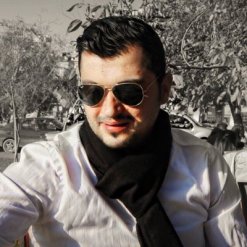 Interview with Mahmoud al-Basha by Francesco Petronella, previously published in the print version of
Interview with Mahmoud al-Basha by Francesco Petronella, previously published in the print version of 